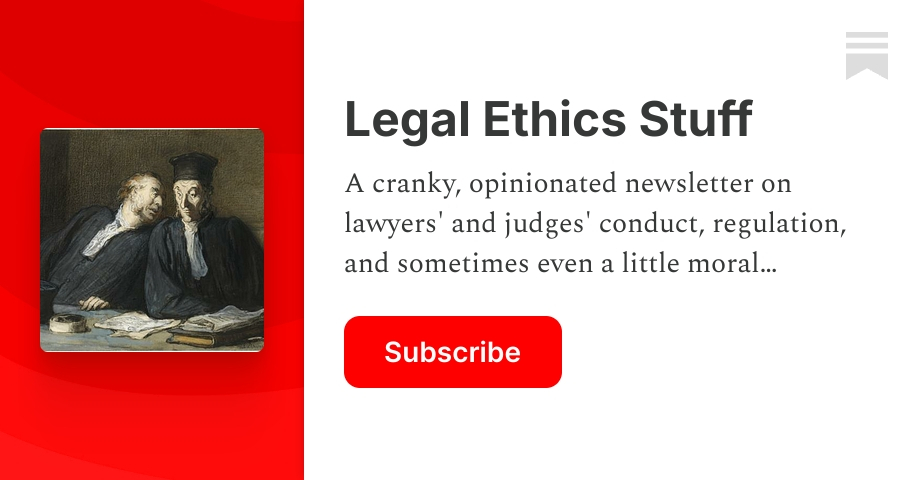bradwendel.substack.com/p/ai-wtf/comment/118672513
Preview meta tags from the bradwendel.substack.com website.
Linked Hostnames
2Thumbnail

Search Engine Appearance
Brad Wendel on Legal Ethics Stuff
I agree that these fake-citation cases are much easier for discipline. I've always been frustrated by the extreme reluctance of judges to impose Rule 11 sanctions in anything but the most flagrant cases. Some of the Sidney Powell cases, including the 10th Cir. case, are the rare exception that prove the rule. Maybe it comes from having colleagues who are trained as social psychologists, or maybe it's a result of teaching a business ethics class from a moral psychology point of view, but I find it helpful to have an explanation in terms of a psychological mechanism rather than simply stigmatizing it as laziness. Putting it differently, an interesting question would be why lawyers give into laziness when they should know the consequences of submitting fake citations to a court are very severe. The idea of being lulled into a false sense of security by increasingly familiar technology is a reasonable explanation. There's a lot of human behavior that is a real puzzle if we assume people act rationally, but which makes sense if we look for patterned irrational behavior. The post-Kahneman & Tversky literature is very helpful here, but I didn't want to make the post even longer. I thought the Australian study was helpful in explaining what would otherwise be difficult-to-explain errors.
Bing
Brad Wendel on Legal Ethics Stuff
I agree that these fake-citation cases are much easier for discipline. I've always been frustrated by the extreme reluctance of judges to impose Rule 11 sanctions in anything but the most flagrant cases. Some of the Sidney Powell cases, including the 10th Cir. case, are the rare exception that prove the rule. Maybe it comes from having colleagues who are trained as social psychologists, or maybe it's a result of teaching a business ethics class from a moral psychology point of view, but I find it helpful to have an explanation in terms of a psychological mechanism rather than simply stigmatizing it as laziness. Putting it differently, an interesting question would be why lawyers give into laziness when they should know the consequences of submitting fake citations to a court are very severe. The idea of being lulled into a false sense of security by increasingly familiar technology is a reasonable explanation. There's a lot of human behavior that is a real puzzle if we assume people act rationally, but which makes sense if we look for patterned irrational behavior. The post-Kahneman & Tversky literature is very helpful here, but I didn't want to make the post even longer. I thought the Australian study was helpful in explaining what would otherwise be difficult-to-explain errors.
DuckDuckGo
Brad Wendel on Legal Ethics Stuff
I agree that these fake-citation cases are much easier for discipline. I've always been frustrated by the extreme reluctance of judges to impose Rule 11 sanctions in anything but the most flagrant cases. Some of the Sidney Powell cases, including the 10th Cir. case, are the rare exception that prove the rule. Maybe it comes from having colleagues who are trained as social psychologists, or maybe it's a result of teaching a business ethics class from a moral psychology point of view, but I find it helpful to have an explanation in terms of a psychological mechanism rather than simply stigmatizing it as laziness. Putting it differently, an interesting question would be why lawyers give into laziness when they should know the consequences of submitting fake citations to a court are very severe. The idea of being lulled into a false sense of security by increasingly familiar technology is a reasonable explanation. There's a lot of human behavior that is a real puzzle if we assume people act rationally, but which makes sense if we look for patterned irrational behavior. The post-Kahneman & Tversky literature is very helpful here, but I didn't want to make the post even longer. I thought the Australian study was helpful in explaining what would otherwise be difficult-to-explain errors.
General Meta Tags
16- titleComments - AI . . . WTF? - by Brad Wendel
- title
- title
- title
- title
Open Graph Meta Tags
7- og:urlhttps://bradwendel.substack.com/p/ai-wtf/comment/118672513
- og:imagehttps://substackcdn.com/image/fetch/$s_!AiLe!,f_auto,q_auto:best,fl_progressive:steep/https%3A%2F%2Fbradwendel.substack.com%2Ftwitter%2Fsubscribe-card.jpg%3Fv%3D1154026622%26version%3D9
- og:typearticle
- og:titleBrad Wendel on Legal Ethics Stuff
- og:descriptionI agree that these fake-citation cases are much easier for discipline. I've always been frustrated by the extreme reluctance of judges to impose Rule 11 sanctions in anything but the most flagrant cases. Some of the Sidney Powell cases, including the 10th Cir. case, are the rare exception that prove the rule. Maybe it comes from having colleagues who are trained as social psychologists, or maybe it's a result of teaching a business ethics class from a moral psychology point of view, but I find it helpful to have an explanation in terms of a psychological mechanism rather than simply stigmatizing it as laziness. Putting it differently, an interesting question would be why lawyers give into laziness when they should know the consequences of submitting fake citations to a court are very severe. The idea of being lulled into a false sense of security by increasingly familiar technology is a reasonable explanation. There's a lot of human behavior that is a real puzzle if we assume people act rationally, but which makes sense if we look for patterned irrational behavior. The post-Kahneman & Tversky literature is very helpful here, but I didn't want to make the post even longer. I thought the Australian study was helpful in explaining what would otherwise be difficult-to-explain errors.
Twitter Meta Tags
8- twitter:imagehttps://substackcdn.com/image/fetch/$s_!AiLe!,f_auto,q_auto:best,fl_progressive:steep/https%3A%2F%2Fbradwendel.substack.com%2Ftwitter%2Fsubscribe-card.jpg%3Fv%3D1154026622%26version%3D9
- twitter:cardsummary_large_image
- twitter:label1Likes
- twitter:data11
- twitter:label2Replies
Link Tags
32- alternate/feed
- apple-touch-iconhttps://substackcdn.com/image/fetch/$s_!h0jr!,f_auto,q_auto:good,fl_progressive:steep/https%3A%2F%2Fsubstack-post-media.s3.amazonaws.com%2Fpublic%2Fimages%2Fde16fa09-a234-484c-8edc-c5041d12ee76%2Fapple-touch-icon-57x57.png
- apple-touch-iconhttps://substackcdn.com/image/fetch/$s_!q-z3!,f_auto,q_auto:good,fl_progressive:steep/https%3A%2F%2Fsubstack-post-media.s3.amazonaws.com%2Fpublic%2Fimages%2Fde16fa09-a234-484c-8edc-c5041d12ee76%2Fapple-touch-icon-60x60.png
- apple-touch-iconhttps://substackcdn.com/image/fetch/$s_!CAD0!,f_auto,q_auto:good,fl_progressive:steep/https%3A%2F%2Fsubstack-post-media.s3.amazonaws.com%2Fpublic%2Fimages%2Fde16fa09-a234-484c-8edc-c5041d12ee76%2Fapple-touch-icon-72x72.png
- apple-touch-iconhttps://substackcdn.com/image/fetch/$s_!G6Qq!,f_auto,q_auto:good,fl_progressive:steep/https%3A%2F%2Fsubstack-post-media.s3.amazonaws.com%2Fpublic%2Fimages%2Fde16fa09-a234-484c-8edc-c5041d12ee76%2Fapple-touch-icon-76x76.png
Links
13- https://bradwendel.substack.com
- https://bradwendel.substack.com/p/ai-wtf/comment/118672513
- https://bradwendel.substack.com/p/ai-wtf/comments#comment-118672513
- https://substack.com
- https://substack.com/@bradwendel/note/c-118672513